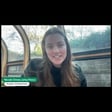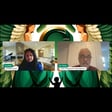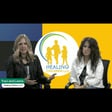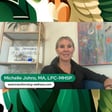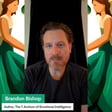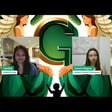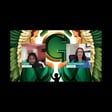Become a Creator today!Start creating today - Share your story with the world!
Start for free
00:00:00
00:00:01

Season Two/Episode Ten: Drawing Outside the Lines - Reimagining Educational AI for Diverse Minds
In an era where technology shapes how we learn and teach, crucial questions emerge: How do we make the most of educational technology while ensuring it serves all learners equitably?
Deb Mallin, founder of Mighty Doodle, explores the delicate balance between technological innovation and responsible, student-centered learning.
In this episode, we discuss how AI can create more inclusive literacy experiences, the ethical considerations of developing EdTech for young learners, and Deb's vision for a future where technology serves the needs of all children – not just those who learn conventionally.
Transcript
Introduction to Guardians of Hope Podcast
00:00:00
Speaker
Welcome to the Guardians of Hope podcast, where we bring together parents, nonprofits, legal and medical experts dedicated to positively impacting children's lives.
00:00:12
Speaker
I'm your host, Cynthia Ramsaran. The thoughts and opinions of my guests are not necessarily my own. So thank you all for joining and sharing.
Role of Technology in Education
00:00:22
Speaker
All right, welcome everyone.
00:00:24
Speaker
in an era where technology shapes how we learn and teach, crucial questions emerge. How do we make the most of educational technology while ensuring it serves all learners equitably?
00:00:37
Speaker
What does truly ethical ed tech look like in practice? And how can we design digital learning experiences that prioritize students' well-being alongside academic achievement?
Meet Deb Mallon: Founder of Mighty Doodle
00:00:51
Speaker
To guide us through these complex questions, I'm thrilled to welcome Deb Mallon, founder of Mighty Doodle, an AI-powered virtual tutor that helps children in grades one through four learn to read, write, and spell.
00:01:06
Speaker
What makes Deb's perspective particularly valuable is how deeply personal this work is for her. As a mother of a child with dyslexia and attention deficits, her insights aren't just theoretical, they're grounded in lived experience and a passionate commitment to creating technology that truly serves diverse learners.
00:01:27
Speaker
Deb, welcome. Thanks for joining. Thank you for having me. um I appreciate the opportunity to talk about this issue on your platform. And just if I may, I recently, um you did a podcast, so I'm a listener and a follower, of course, have about motherhood in crisis. And it was particularly impactful for me because it's further complicated by families who struggle with children with neurodivisent neurodivergent brains, beautiful brains.
00:02:00
Speaker
And so thank you for that wonderful podcast. Thank you. mothers Thank you, Cynthia. I'm so looking forward to learning more about you and what you do. and um and how we can connect the dots as parents and educators.
Deb's Journey into Ed Tech
00:02:16
Speaker
So why don't you talk to us about your journey into ethical ed tech? I know you you mentioned that it was influenced by your experience as a parent, and um I'd love to have you share your personal experience on what technology and education should accomplish.
00:02:33
Speaker
Thanks. um So as you mentioned, as a mom with a son with a sort of the triple issues we have dyslexia, ah deficits in attention and dysgraphia.
00:02:46
Speaker
I quickly realized that tools were not being built um for him. they They didn't have him in mind. Most of them were made for an average learner. um Spoiler alert, there's no such thing as an average learner.
00:03:00
Speaker
and They don't exist. But I had a sort of a front row seat to that frustration, but also those really joyful moments where he would light up because it all made sense to him.
00:03:12
Speaker
So it became clear that um he would be left out. And so the question became, why are children like my son and others left out?
00:03:24
Speaker
And then the second question was, why is this okay? Because certainly it's not okay. um Also, you should know that I never set out to be um in educate an ed tech person ever. i was a Luddite. I was really strict about my children um having access to screens.
00:03:45
Speaker
And so that all came later. i was focused on helping my child and my students and then like a surprise party. with lots of business books and spreadsheets, I ended up, ah for better for worse, going from a classroom to a boardroom.
00:04:02
Speaker
So i guess never say never. um That's how this whole thing sort of unfolded. Understood.
Principles of Ethical Ed Tech
00:04:10
Speaker
Thank you for explaining that to us, Deb.
00:04:12
Speaker
Now, the term ethical ed tech could mean different things to different people. How do you define it? And what are the non-negotiable principles that should guide the development of educational tech?
00:04:24
Speaker
So I think there are three priorities to really start with. um Children's dignity, privacy, and their unlimited potential over profits and vanity metrics.
00:04:38
Speaker
A couple things. So my non-negotiables, evidence-based technology grounded in neuroscience and um Evidence-based methods, that's a non-negotiable when you are developing things that are reaching children and teaching them in an ethical way ah and teaching them correctly the first time.
00:05:00
Speaker
The second thing is ah sort of inclusion is not by default. So Mighty Doodle was not just designed for children like ah my son, it was designed for children with other um neuro differences and challenges, right? And it wasn't an afterthought.
00:05:22
Speaker
It wasn't just tacked on at the end. It was defined at its core, um it was about about those children. um Another really critical point would be very transparent,
00:05:36
Speaker
ah d um what am I trying to say Transparent data practices. So I'm clear about what's collected. Our entire organization is clear about what is collected, why it's collected, and then how it is used.
00:05:52
Speaker
So we're very public and transparent about that. The last thing I would say is we design, and I think all ed tech should be designed, not as a replacement of a person, but rather as a tool and to help engage caregivers, teachers, whoever is working with a child in conjunction with them. This is a tool. It's not a replacement.
00:06:18
Speaker
my Also, I guess the the the last part I want to add in is don't design to fit into a system of other things that are designed. um That's not ethical.
00:06:29
Speaker
it's It's just expensive digital wallpaper adding to a list of things you're creating. Make it meaningful. Make it make it matter. Yeah, that's great. And it's it's ah it's important that you mentioned that it's a complementary part of the total education experience rather than a
Guidelines for Ethical Data Practices
00:06:49
Speaker
replacement.
00:06:49
Speaker
You know, that's so important to note. And when you're looking at the different types of apps and um tools that are available, Educators and parents often struggle to separate the beneficial tools from like digital busy work, if you know what I mean.
00:07:06
Speaker
What framework do you recommend when evaluating whether an ed tech solution is both ethical and effective? It's a great question.
00:07:17
Speaker
So I would advise any parent to just sort of do a ah gut check. the three The three things in my gut check, right, would be does it align with how children learn best? Right.
00:07:28
Speaker
Children first. Second all, is it joyful? Is it accessible? Can it engage children meaningfully? Right. um And you'll know that because we do a lot of quality assurance and testing and play testing. So all ethical technology should do that as well.
00:07:45
Speaker
And then does it does it reflect privacy and avoid. um I want to use the word exploitation because it's a strong word, but we're not OK with creepy tracking or manipulative designs.
00:08:01
Speaker
Again, full transparency, what are you tracking, how are you tracking it, and why? Otherwise, you're just ah collecting more data than the value that you're returning, and it's ah it's surveillance in a hoodie.
00:08:18
Speaker
the Yeah. And you talking, speaking about data, many tools collect data about students' learning behaviors. What ethical guidelines should govern how this data is collected, used, and protected, especially when working with minors?
00:08:35
Speaker
Yeah, that's a great question, too. So here's what I would say.
00:08:42
Speaker
Would you be comfortable sitting at a dinner table with parents and explaining what you're tracking and why? Because if you're not, then don't do it. It's just that simple.
00:08:53
Speaker
um Some key principles, minimal data with a maximum purpose, collect what's only necessary and not anything further. ah Consent and transparency.
00:09:04
Speaker
We have a rigorous profit. There are guidelines, government guidelines, and then of course, Apple. they are very strict in how they vet all programming and apps. And we've built ah more than one with them. And we've seen that firsthand, which I do appreciate.
00:09:20
Speaker
And then the last thing I would say is know that this data belongs to a child, not the platform, not an investor, and not even a school district.
00:09:32
Speaker
It's the child's data. And that child is you know protected by their parents And we have to respect that. There was an interesting study I'd love to quote. um I think it was in 2023, the Center of Democracy and Technology, right?
00:09:47
Speaker
The report said that 60% of parents are deeply concerned about how schools use their child's data and only 40% even understand what they're doing with it. Wow. it's not that That's not about just compliance, right? This has to also be about respect, respect for parents and children.
00:10:08
Speaker
Absolutely.
Involving Educators in Ed Tech Design
00:10:10
Speaker
Now, how can we better prepare teachers to be critical consumers and effective implementers of ed tech rather than just being passive recipients of whatever tools are being purchased by institutions?
00:10:25
Speaker
Another great question. Thanks, Cynthia. So I will forever believe, um
00:10:33
Speaker
assume best intention. So I do And let me preface this by saying I'm a teacher. I've been an educator for 35 years. Teachers live to teach.
00:10:44
Speaker
We live to teach. And we're just we're so often overwhelmed. And so when we're presenting something to a teacher, we not we don't just want to throw them a tool. We want them to understand the why so that they know what they're doing and why they're doing it and and how it supports their goals in their classroom.
00:11:03
Speaker
um I think it's nice when we treat those teachers with respect, not just how to click through it, but how to ask questions about the tool, learn about the tool.
00:11:14
Speaker
It's something they're choosing to use with the their precious students. As our parents, I want to know what I'm putting in front of my child. um And then Something else that's really important is invite your teachers into the design loop, which we we did, right?
00:11:31
Speaker
Teachers are the frontline experts. They are about children first. That's why they chose this profession. Parents were about our children first. That's why we have children. to to love and protect them.
00:11:43
Speaker
So um together, we all need to be critical thinkers and understand why we're making the choices that we do, you know while also respecting the autonomy of a teacher. and They get to choose what works for their students.
00:11:58
Speaker
um and Same with districts, right? They don't just want a procurement chart, a PDF that sort of shows this is what we use. but but pa pa um you want to You want to make great choices.
00:12:11
Speaker
um You have a teacher who wants to take their laptop, like the back end portal that we develop, and they want to put it in the garbage can. That's not a user issue, right? That's on us.
00:12:21
Speaker
We failed. which we don't, of course, because we take feedback all the time from the grownups and we're very proud of our teacher and parent portals.
00:12:34
Speaker
So um I would just really, again, focus on respect. ah Yeah, and that that's my focus here. Yeah, no, that's really helpful, Deb. Thank you.
Role of Former Students in Development
00:12:45
Speaker
Now I have one more question for you, ah um for our listeners who are parents and educators or even ed tech developers themselves. What's one actionable step they can take tomorrow to promote more ethical approaches to technology and education?
00:13:04
Speaker
oh good question again. So
00:13:09
Speaker
I'll prioritize my one because it's near and dear to my heart, which is I loved having my former students um both providing insight into the development of Mighty Doodle and actually in the boardroom.
00:13:24
Speaker
So some of my students are obviously adults as are my adult sons now. And having them on this mission with us to teach all children how to read, write, and spell using ethical technology has really, it's been an extraordinary journey and so proud of our team. All right.
Conclusion and Call to Action
00:13:47
Speaker
Deb, where can our listeners learn more about your work? Well, of course, they can go to MightyDoodle.com, our website. We also have blogs that they can access.
00:13:58
Speaker
And then we offer a free week when you download Mighty Doodle on your iPad or your iPhone. So try it out for a week and watch your child.
00:14:10
Speaker
and see how they learn. And once you've downloaded it and they're working for weeks, please check in and have them doing their work next to your work or your work is chopping vegetables in the kitchen, have them working it and doing Mighty Doodle.
00:14:24
Speaker
Also um feel free to reach out to us. We love to hear from families. We love to hear the success stories. We love all the feedback. So thank you so much for your time and sharing your information with us today.
00:14:40
Speaker
Thanks for being a part of the mission. Thank you.

